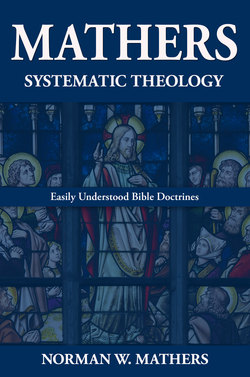Читать книгу Mathers Systematic Theology - Norman W. Mathers - Страница 7
1.1.5 Acts 17:22-31
ОглавлениеPaul was in Athens on his second missionary journey (Acts 17:16). The philosophers brought Paul to “areios pagos” the Hill of Mars (Newman 1968:24). This was where the Athenian court was held. The apostle observed that among their objects of worship an altar with the inscription “to agnostic God” [author’s translation] (Aland & Black 1968:468). The Athenians verified the truth that man suppresses the knowledge of God’s existence by creation. They blamed God for not revealing Himself (Acts 17:23). This is an example given by Paul of the religiousness of the Athenians. The “ta sebasmata humon” should be translated the objects of your worship. This word is from the verb sebazomai which means to worship. The objects of your worship refer to temples, altars, and statutes. Next, Paul observed an altar with an inscription “en o epegegrapto”. This verb is a pluperfect passive voice which needs to be translated “it has been written” (Han 1974:269). The action has been completed. Robertson explains lest their gods be angry they dedicated this altar to the unknown god in case they missed one (Robertson 1930:3:285). The greek word “agnosto” is the word from which we derive the word agnostic. The Athenians had 30,000 gods (ibid:3:286). Paul presents the facts that “God made the world (kosmos), and all which [is] in it, this one exists lord (kurios) of heaven and earth, he dwells not in handmade temples” [author’s translation] (17:24) (Aland & Black 1968:486). The Lord is the absolute sovereign of both heaven and earth. Robertson draws our attention to the fact that the backdrop for Paul’s words are from Isaiah 42:5 and 45:7 (1930:3:286). The emphasis is on the fact that the temple was not made by human hands as indicated by the emphatic negative (ouk)(Aland & Black 1968:486). This Lord of heaven and earth was not in need of anything (17:25). Robertson adds this was far different than their gods who were in need of their offerings to obtain happiness (Robertson 1930:3:287). The Lord of heaven and earth “is not served by hands of men nor needing anything” [but] “He gives” (giving present active participle of didomi- continuous action) “to all life and breath and all things” (Aland & Black 1968:486). Robertson points out that here Paul has raised the thought of the Greek philosophers (1930:3:287). “He has made from one blood every race of men to dwell on all face of the earth” (Greek word ges is the world of nature) [author’s translation] (Aland & Black 1968:486). Paul expounds the fact that God determined beforehand (prostetagmenous) seasons. This word seasons is the Greek word kairos which is a special time a fulfilled moment of history. The Germans during the 1920’s through the 1940’s thought a new world order was appearing on the horizon. God has foreordained the length of a nation’s life and their boundaries (Acts 17:26). He has done this so that the nations might seek God (Robertson 1930:3:288). “If indeed, they may have searched” (Arndt and Gingrich 1973:900) “for Him and they may have found Him” [author’s translation] (Aland & Black 1968:486). The apostle adds: “and not existing far from each one of us” [author’s translation] (Acts 17:27) (ibid:486). The Greek word ge coming after the coordinate conjunction kai (and) stresses the emphatic kai (and). Robertson categorizes this as an intensive particle (ibid:3:289). The apostle introduces the reason why this is true with the gar clause in 17:28: “for in him we live and we move and we are as also some of the poets among us have said” (perfect indicative active of eipon – Han 1974:270)[author’s translation] (Aland & Black 1968:486). The apostles’s partial conclusion in 17:29 is indicated by the word “oun”(Hoehner 1975). “Existing offspring of God, we are not obligated to think the divine nature to be like gold or silver or stone, image of a skilled trade and thought” (idea) “of man” (17:29) (Alan & Black 1968:487). Robertson adds to the discussion pointing to God’s sovereign control of history which accounts for the rise and fall of the nations of the world. God has determined both the length of the life of a nation and their boundaries. Paul proves the immanence of God in 17:28 (Robertson 1930:3:289). The special revelation of Acts 17:30-31 points to the meaning of the resurrecton for unbelievers that they are under judgment. God commands men to repent (Acts 17:30). He has appointed a day by which he will judge men by the standard of righteousness. He has furnished proof to all men by raising Christ from the dead (Acts 17:31).
